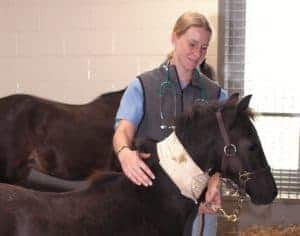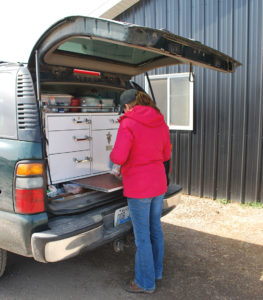Donkeys Metabolize Meals and Drugs Differently Than Horses

When it comes to hormones, metabolism, and how the body processes drugs, donkeys and horses have considerable differences.
Understanding those differences can significantly improve how equine veterinarians diagnose and treat donkeys—it can even save their lives—but more research is still needed, said Ramiro E. Toribio, DVM, MS, PhD, Dipl. ACVIM, professor of equine internal medicine at The Ohio State University, in Columbus. Toribio spoke about the particularities of diagnosing and treating donkeys during the 2021 American Association of Equine Practitioners’ convention, held Dec. 4-8 in Nashville, Tennessee and virtually.
Donkeys evolved to be an “energy-efficient” species living off tough, sparse forage and browse usually in very dry climates, Toribio said. That probably explains why their bodies manage glucose and fat and metabolize medications differently than horses.
“Then along came the human, and Mother Nature did not intend the burro to be eating better-quality grass and these kinds of stuff,” he said. “That was not the purpose.”
Endocrine Disorders
Like horses, donkeys and mules can develop metabolic disease. In horses this condition is referred as equine metabolic syndrome (EMS), while in donkeys scientists refer to it as donkey metabolic syndrome (DMS) or asinine metabolic syndrome (AMS). Just as in horses, the syndrome arises from insulin dysregulation and can lead to laminitis and other complications.
Donkeys, however, are far more efficient than horses in how they use glucose—“like cash, you know, (they) spend it easily”—and fat—“like savings, slow to save, slow to make withdrawals, but good to have,” he said.
This means even diagnostic testing differs for donkeys. For example, for horses, after intravenous insulin and glucose challenge tests, veterinarians check whether glucose levels are above baseline at 45 minutes. But in donkeys, the wait time should be 60 minutes or longer. “Basically, the effect of insulin is faster in horses,” Toribio said.
“Glucose produces a very strong activation of insulin secretion in donkeys,” Toribio said. “So do not extrapolate from horses. Because if you extrapolate from horses, you can misdiagnose many donkeys, either with the wrong condition or with a positive or negative diagnosis.”
Dr. Ramiro E. Toribio
The differences extend even to weight loss; helping donkeys lose weight is tricky because they’re at risk of mobilizing triglycerides when they’re fasting. That means they could have an abnormally high concentration of lipids in the blood, known as hyperlipidemia, which can be deadly. “Pay attention when you have a donkey that is not eating and is in good body condition, because they’re more likely to develop hyperlipidemia,” he said. “Weight loss in donkeys must be a very slow process.”
Commercial diets meant for managing insulin dysregulation and obesity in horses might not work for donkeys, Toribio said. And grazing muzzles could cause them stress that could trigger additional health problems.
Like horses, however, donkeys can develop pituitary pars intermedia dysfunction (PPID, or Cushing’s disease), though owners might miss the initial signs. Many donkeys have naturally long hair coats year-round, he explained, and lethargy might be mistaken for their calm temperaments.
Adrenocorticotropic hormone (ACTH) concentrations can help veterinarians diagnose PPID in donkeys, as they do in horses. Healthy donkeys naturally have higher ACTH levels than healthy horses and ponies, said Toribio. “Therefore, do not use equine ACTH reference values in donkeys,” he said. Also, just like in horses and ponies, donkeys’ ACTH levels fluctuate according to the season.
Drug Metabolism
Donkeys are master metabolizers for drugs, too. They process most drugs much faster than horses and have more water in their cells, meaning drugs clear from their systems faster, said Toribio. As a result, practitioners should prescribe either higher or more frequent doses of many medications for donkeys, including antimicrobials, non-steroidal anti-inflammatories (NSAIDs), and analgesics (pain-relievers). That’s also true for sedatives and tranquilizers—and veterinarians must be particularly careful to watch for signs the medication is effective, because donkeys can be very stoic and hide signs of pain. Some donkeys might need as much as twice the dose of horses for the same effect, he said.
On the flip side, donkeys can quickly overdose on certain types of drugs, he said. Imidocarb dipropionate, used for treating piroplasmosis, for example, can lead to liver and neurologic problems and should be given at lower doses. Pergolide, the mainstay treatment for PPID, should also be given to donkeys at lower doses.
In addition, deworming medications based on macrocyclic lactones can cause toxicity, especially in donkeys with poor body condition. Other anthelmintics have varying absorption rates, and efficacy in donkeys should be considered individually.
Take-Home Message
Overall, details on donkeys’ endocrinology and pharmacology is lacking, said Toribio. More research could lead to better understanding of this popular companion and working animal species. “We need money to do more research,” he said.

Written by:
Christa Lesté-Lasserre, MA
Related Articles
Stay on top of the most recent Horse Health news with















